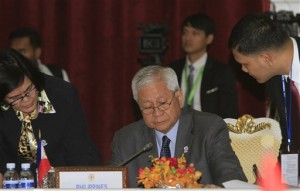PH deplores non-issuance of Asean communiqué
MANILA, Philippines—The Philippines on Friday deplored the non-issuance of a joint statement at the end of the 45th Association of Southeast Asian Nations (Asean) Foreign Ministers’ Meeting held in Cambodia.
Foreign Secretary Albert del Rosario said the failure to issue a joint statement was unprecedented in Asean’s 45-year history.
A joint communiqué would have included Asean’s stand on the territorial disputes of some members of the bloc with China in the West Philippine Sea (South China Sea).
Del Rosario said the Philippines took strong exception to the statement made by Cambodia, host of the meeting, that this would be “the first time that Asean is not able to issue the joint communiqué due to bilateral conflict between some Asean member states and a neighboring country.”
He said he had discussed the situation at Panatag Shoal (Scarborough Shoal) in several meetings in Phnom Penh starting Monday.
“There was a considerable amount of discussions on Scarborough Shoal in all of the forums that were held there,” Del Rosario told reporters. “I think we were successful in being able to bring to the [forums] the challenges that the Philippines faces in that area.”
Asked for comment on China’s allegation that the Philippines was causing trouble, Del Rosario said: “I think even when we were silent, we were being accused of escalating; when we were responding, we were accused of being the bully. Those are my humble observations.”
Cambodia’s opposition
Explaining the controversy about the Asean joint statement, Del Rosario said: “We simply wanted the fact that we discussed the issue and it should be reflected in the joint communiqué, no more, no less. It would have just been a simple sentence or paragraph in the communiqué. We just want a recognition that the Scarborough Shoal was in fact discussed.”
Del Rosario said several Asean states and the Asean secretariat supported the Philippine position that the Scarborough Shoal discussion should be reflected on the joint statement.
“However, the chair [Cambodia] has consistently opposed any mention of the Scarborough Shoal at all in the joint communiqué and today announced that a joint communiqué ‘cannot be issued.’”
Del Rosario declined to name the countries that supported the Philippines’ position, saying “I may be putting in jeopardy those countries that I do not name, so I would prefer not to do that.”
“The first position the chair took was that he doesn’t want to mention bilateral issues,” Del Rosario said. “But if you look at many of the issues that we had, all of them have a bilateral aspect to it.”
He said it was not true that the Asean did include bilateral matters in joint statements. “The most recent example of this was the problem between Cambodia and Thailand. In every meeting, that was brought up as a matter of discussion with no reservations,” Del Rosario said.
International issue
The Philippines, Del Rosario said, maintains that since the competing claims in the West Philippine Sea are not mere bilateral conflicts with a northern neighbor but multilateral, these should be resolved multilaterally.
“In the case of Bajo de Masinloc (Scarborough Shoal),” Del Rosario said, “the situation there threatens the peace, stability, freedom of navigation and the unimpeded commerce in the South China Sea (West Philippine Sea). It’s not only a bilateral and a regional issue but an international one as well.”
Asked if Cambodia was pressured by China, Del Rosario said: “I don’t want to speak for the chair. That question should be answered directly by him. But at one point, he indicated that he had political reasons.”
Multilateral solution
Del Rosario said the Asean consensus reached during the senior officials meeting in June on the elements of a code of conduct in the West Philippine Sea clearly underscored the pursuit of a multilateral resolution of the disputes, not a bilateral resolution that China preferred.
“Further, the Asean foreign ministers have already agreed to initiate discussions between Asean and China on the development of the code of conduct,” he added.
Del Rosario said the problem that arose during the Phnom Penh meeting should not be seen as a beginning of a tear in Asean.
“I think it just presents a bigger challenge for us to continue to build on what we stand for—leadership, centrality, solidarity,” he said. “I think we have now realized that we need to work, all of us need to work together in building this community we’re targeting for 2015,” Del Rosario said.
For comprehensive coverage, in-depth analysis, visit our special page for West Philippine Sea updates. Stay informed with articles, videos, and expert opinions.
